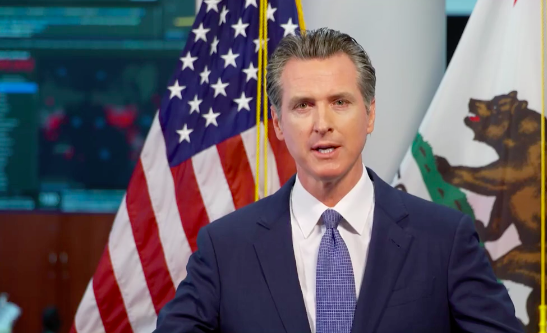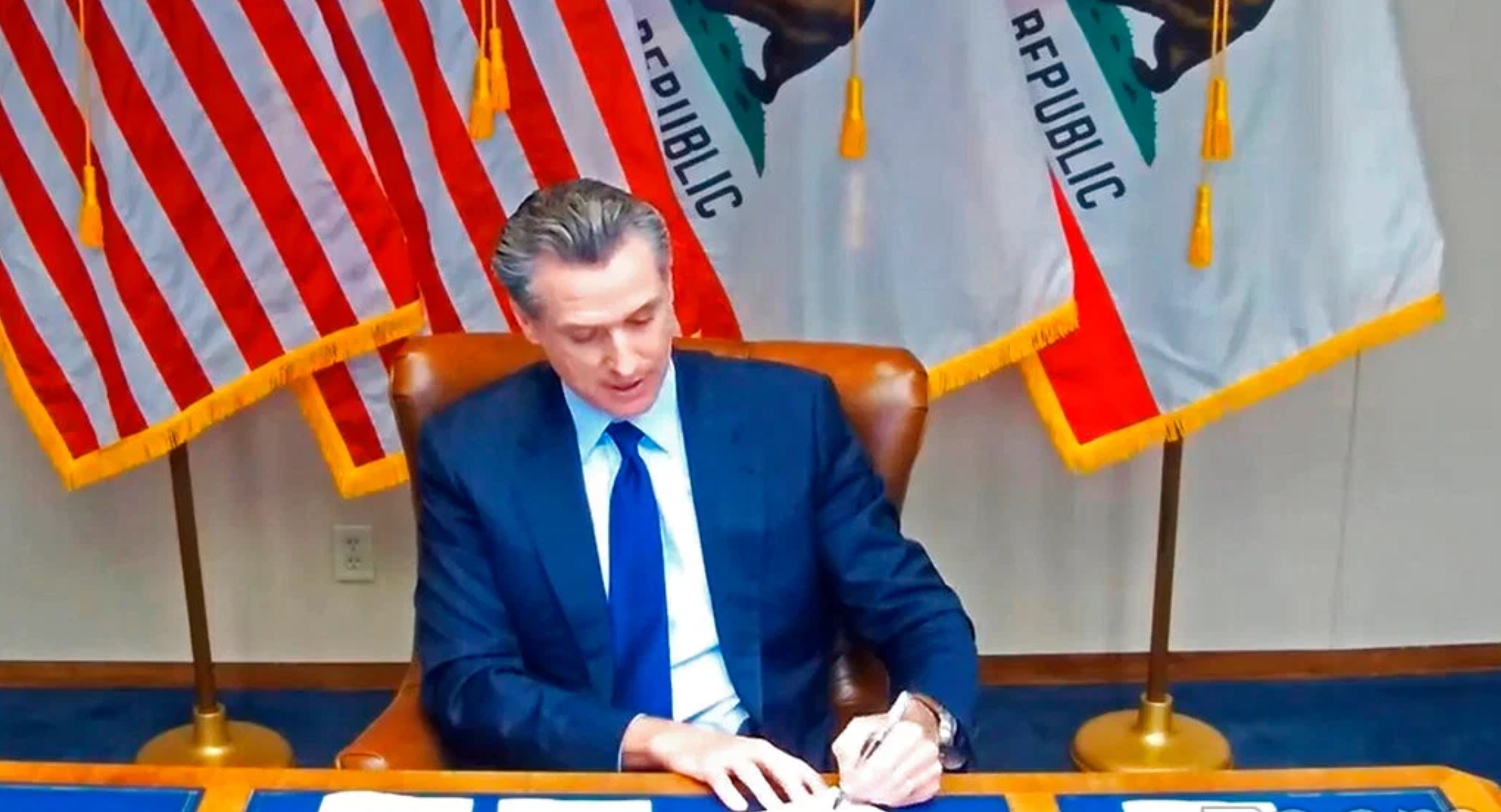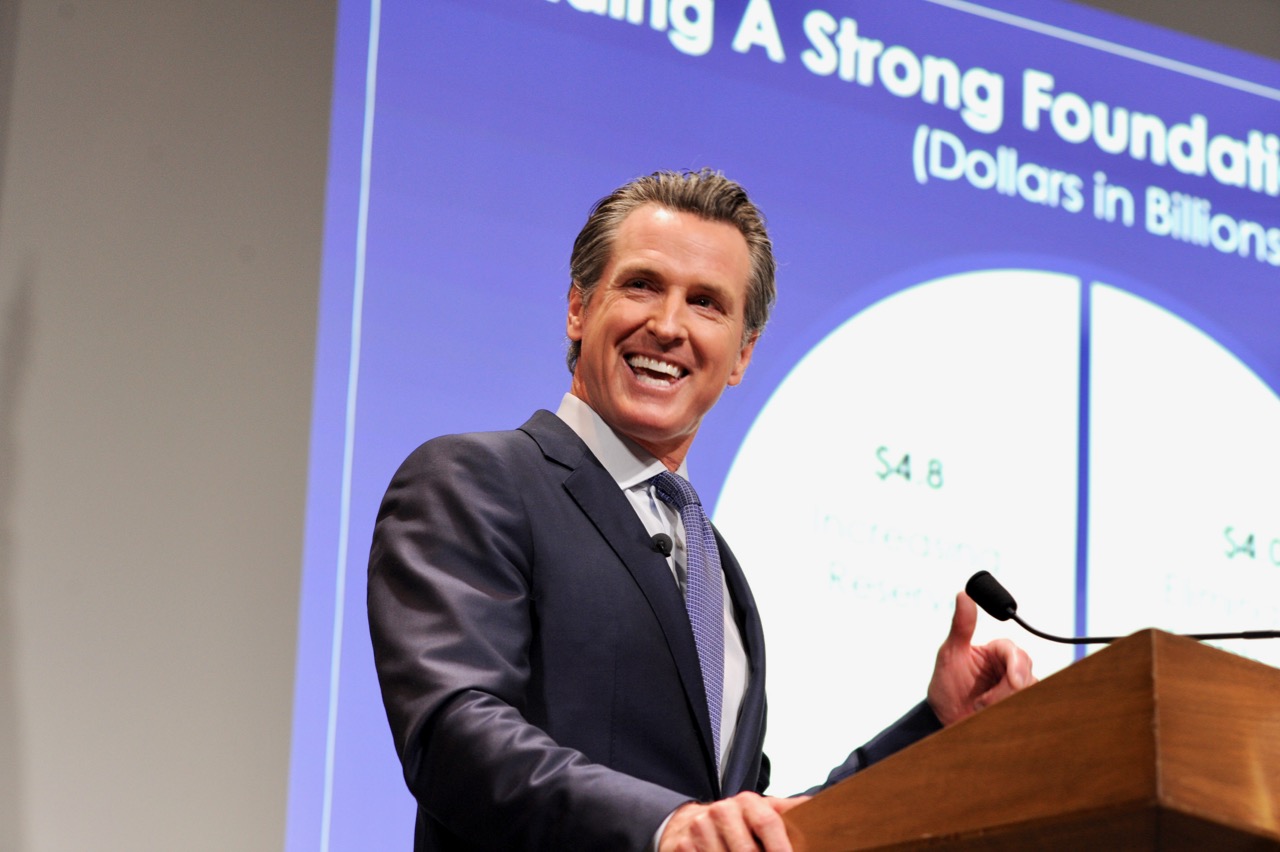
Gov. Gavin Newsom (Photo: screen capture governor's video press conference)
Governor Vetoes Several Environmental Bills
Wildfire risk model, toxics board requirements, toxic wood waste program
By Chris Micheli, October 1, 2020 6:30 am
As Governor Gavin Newsom concluded his actions on over 400 bills sent him by the Legislature during the 2020 Session, he vetoed several environmental measures, including the following:
AB 995 by Assemblywoman Cristina Garcia (D-Bell Gardens)
AB 995 would have created the Board of Environmental Safety in the California Environmental Protection Agency. The bill would have provided requirements for the membership of the board and would have required the board to conduct no less than 6 public meetings per year. The bill would have established an office of ombudsperson in the board to receive complaints and suggestions, to evaluate complaints received, to report findings and make recommendations to the Director of Toxic Substances Control and the board, and to render assistance.
The Governor’s veto message was: “I am returning Assembly Bill 995 without my signature. This bill would create the Board of Environmental Safety within the California Environmental Protection Agency (CalEPA) to provide policy direction to and oversight of the Department of Toxic Substances Control (DTSC).
“I applaud the author’s diligence in seeking to increase transparency and accountability in DTSC. However, the bill as written falls short of the goals we have previously set for needed changes to better protect public health and safety. Without necessary funding, DTSC will be unable to deliver on the promise of this legislation – cleaning up too many abandoned sites adversely impacting the health of low-income communities across our state and better protecting Californians from dangerous chemicals going forward.
“Understanding that governance and fiscal changes are both necessary and inextricably tied to achieving the mandates DTSC is currently responsible for, my 2020 Budget proposed a comprehensive approach to achieve a more transparent decision-making process through the creation of a board and restructured fees to adequately fund this Department.
“AB 995 seeks to impose changes to governance but lacks necessary fiscal reform.
“To accomplish comprehensive change and make progress on the more than 150,000 brownfield sites where no responsible party exists, we will need comprehensive fiscal reform to support adequate revenues. Over the last year, we were able to reach agreement with the Legislature on many of the key elements of DTSC reform. I am confident that in the upcoming legislative session we will achieve the much needed fiscal and governance reforms to better protect communities across our state.”
AB 3164 by Assemblywoman Laura Friedman (D-Glendale)
This bill would have required the Department of Forestry and Fire Protection, by July 1, 2022, to develop a wildland-urban interface wildfire risk model to determine the risk for a community or parcel in a local responsibility area or state responsibility area and guidelines for the proper use of the model. The bill would have required the department to establish, and consult with, an advisory workgroup, with specified members, to develop the model. The bill would have required the department to update the model and guidelines when fire hazard severity zones are revised.
The Governor’s veto message was: “I am returning Assembly Bill 3164 without my signature. This bill would require the Department of Forestry and Fire Protection (CAL FIRE) to work with stakeholders and other governmental entities to develop a wildland-urban interface wildfire (WUI) risk model based on wildfire hazard severity information and a number of other local mitigating factors to determine fire risk to individual parcels and communities.
“I am committed to aggressive fire prevention measures that will reliably and quickly reduce California’s vulnerability to catastrophic wildfires. I commend Assemblymember Friedman for looking for creative ways to effectively study California’s risk in order to advise local and state fire prevention.
“Data-driven decisions and leveraging technology are critical to making our communities more resilient to the threat of wildfire. However, the amount of granular information that would be needed to provide an accurate representation of risk at the parcel level would be a significant workload for the State and local jurisdictions eventually assigned to gather the necessary data.
“Unlike CAL FIRE’s existing fire hazard severity models, fire risk is dynamic and changes based on any number of variables such as whether rain gutters have been cleared of pine needles or dried out grasses have been trimmed away from a structure. As drafted, the bill prescribes mitigation factors and does not provide adequate flexibility for CAL FIRE to determine the appropriate factors for the dynamic risk the model is meant to evaluate.
“I am therefore directing CAL FIRE to work with the Legislature to develop a strategy that would support the deployment of a wildfire risk model that allows for adequate discretion in the development of the model.”
SB 68 by Sen. Cathleen Galgiani (D-Stockton)
This bill would have eliminated the sunset on the Treated Wood Waste (TWW) program at the Department of Toxic Substance Control (DTSC) along with various changes to this program. The bill would have required the wood preserving industry to, in consultation with the department, maintain an internet website and prepare fact sheets and other outreach materials on the appropriate handling, disposal, and other management of treated wood waste for generators of treated wood waste and for facilities that may receive or handle treated wood waste. The bill would have required the wood preserving industry to annually update and renew the outreach materials, disseminate the outreach materials, and provide a specified update to the department relating to that dissemination.
The Governor’s veto message was: “I am returning Senate Bill 68 without my signature. This bill would eliminate the sunset date on the Treated Wood Waste (TWW) program at the Department of Toxic Substance Control (DTSC) and would make various changes to that program.
“SB 68 creates a significant additional mandate for DTSC to perform regular inspections of generators and disposal sites for treated wood waste. The Hazardous Waste Control Account (HWCA) currently has a structural deficit and this unfunded new mandate will cost the department millions of dollars to implement, exacerbating this deficit.
“Moreover, it is not appropriate to eliminate the sunset date for the Treated Wood Waste program authorization, essentially exempting this hazardous waste from hazardous waste law and regulation. While the generation of this waste may have justified the allowance for alternative management standards, this waste is hazardous and poses a risk to both human health and the environmental and necessitates periodic review of its statutory authorization.”
- This Is an Interesting Limit on Rulemaking Power - February 23, 2026
- Miscellaneous Civil Action Proceedings - February 23, 2026
- Probate Code Could Be a Basis for Statutory Interpretation Principles - February 22, 2026




